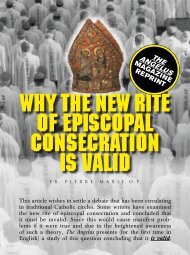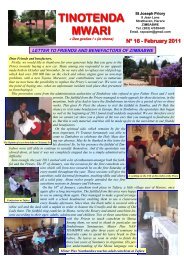Is Feeneyism Catholic? - Society of St. Pius X
Is Feeneyism Catholic? - Society of St. Pius X
Is Feeneyism Catholic? - Society of St. Pius X
You also want an ePaper? Increase the reach of your titles
YUMPU automatically turns print PDFs into web optimized ePapers that Google loves.
22 IS F EENEYISM C ATHOLIC?<br />
In the Summa Theologica, (I-II, Q.113, A.3-5), <strong>St</strong>. Thomas<br />
explains that in the process <strong>of</strong> justification <strong>of</strong> an adult, having the<br />
use <strong>of</strong> his reason, there is need <strong>of</strong> a movement <strong>of</strong> the free will,<br />
including a movement <strong>of</strong> faith and a movement <strong>of</strong> perfect contrition:<br />
no one can be justified if he would remain in complete (even<br />
invincible!) ignorance <strong>of</strong> the Faith! When the Church speaks <strong>of</strong> a<br />
possible “implicit desire,” what is implicit is the doctrine <strong>of</strong> the<br />
sacraments, not the whole doctrine <strong>of</strong> Christ. <strong>St</strong>. Augustine had<br />
said before: “He Who created you without you, shall not justify<br />
you without you.” 29 Note that an infant, not having yet the use <strong>of</strong><br />
his reason, has no other possibility to be saved than through the<br />
actual reception <strong>of</strong> the sacrament <strong>of</strong> baptism, i.e., baptism <strong>of</strong> water.<br />
The Council <strong>of</strong> Trent gives great authority to that teaching <strong>of</strong><br />
<strong>St</strong>. Thomas:<br />
[Adults] are disposed for justification in this way: awakened<br />
and assisted by divine grace, they conceive faith “from hearing”<br />
(Rom. 10:7), and they are freely led to God, believing that the<br />
divine Revelation and promises are true, especially that the unjustified<br />
man is justified by God’s grace “through the redemption<br />
which is in Christ Jesus” (Rom. 3:24); next they know that<br />
they are sinners; and by turning from a salutary fear <strong>of</strong> divine<br />
justice to a consideration <strong>of</strong> God’s mercy, they are encouraged<br />
to hope, confident that God will be propitious to them for<br />
Christ’s sake. They begin to love God as the source <strong>of</strong> all justice<br />
and are thereby moved by a sort <strong>of</strong> hatred and detestation for sin,<br />
27 ST, II-II, Q.2, A.7. In this article, <strong>St</strong>. Thomas teaches that, in the Old<br />
Testament, the common <strong>of</strong> the people could have a mere implicit faith in<br />
Christ, “under the veil <strong>of</strong> the sacrifices” required in the Old Law, believing<br />
what their leaders and Prophets knew explicitly; he also teaches (ad 3) that<br />
among the Gentiles “if, however, some were saved without receiving any<br />
revelation, [the objection to which he answers referring to the “ministry <strong>of</strong><br />
Angels,” he means ‘public revelation’ like that to the Hebrews; he does not<br />
mean ‘without absolutely any revelation’] they were not saved without faith<br />
in the Mediator, for though they did not believe in Him explicitly, they did<br />
nevertheless, have implicit Faith through believing in Divine Providence,<br />
since they believed that God would deliver mankind in whatever way was<br />
pleasing to Him, and according to the revelation <strong>of</strong> the Spirit to those who<br />
knew the truth.” This last phrase refers to private revelations, made to<br />
Gentiles like Job, “who knew the truth.” <strong>St</strong>. Augustine gives other examples.<br />
28 Dz. 1677; see also the first example, p.84.<br />
29 Sermon 169, p.661, Biblioteca de los Autores Católicos (henceforth BAC).











